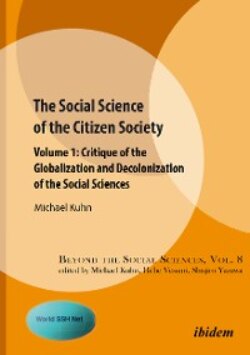Читать книгу The Social Science of the Citizen Society - Michael Kuhn - Страница 4
Preface
Оглавление200 years of critical social science theories, two hundred years of poverty, two hundred years of war, 200 years of colonialism and imperialism, constantly criticized by the professional thinkers of the social sciences—how does this two-hundred-year coexistence of critique and criticized go together?
These two books on the “social science of the citizen society” accuse the latter, which social science theorists do not believe to be possible, of producing not only occasionally, presupposed, that is false theories about the world—wrong, because they criticize the world as a failure of the ideals imputed to it, thereby critically affirming them and thus pursuing the coexistence of critique and the criticized.
The first book on the “Critique of Globalization and De-colonization of the Social Sciences” shows that the arguments with which they justify both what globalization and the de-colonization of their sciences are supposed to be are nothing but preoccupied, false justifications legitimizing the concerns of individual nation-state views of the world. The second book on “The Nature of the Social Science of the Citizen Society—Sketches of a Theory” shows that in the way in which the disciplinary social sciences create their theories by looking at the practical concerns of citizen society, how it thereby produces preoccupied, i.e., false theories about the citizen society, in particular about their state—with the result of this never-ending coexistence of the critical and the criticized.
Such a project that sets out to criticize social science thinking for not only producing occasional false theories, but for being the nature of this kind of thinking about societies, for producing false theories, false theories that, thanks to their false thought, spread critically affirmative legends about the goals and purposes that govern this world, this project is doomed to failure from the outset—at least from the point of view of this social science thinking.
Thanks to its concept of knowledge, social science thinking is in fact immune to a critique that criticizes wrong thoughts. Social sciences are convinced that thinking about the social—and since the interpretation by the social sciences of T. Kuhn’s book about the natural sciences also the natural sciences’ thinking about nature—cannot produce correct knowledge, but only relative correct knowledge, relative to the meta-theories, definitions and methods this thinking applies. Social science theories can indeed be criticized, but this criticism cannot be a criticism of a false theory, but a criticism that argues against all the ex-ante definitions, ethical, scientific-theoretical and methodological assumptions, ex-ante decisions about the object of a theory and about the way in which thinking intends to tackle it, ex-ante decisions that social science thinking must make and whose reasoning it must disclose. The critique that a theory creates wrong thoughts is not an option in social science thinking, because theories can only ever be relatively wrong or right theories measured against all their assumptions and definitions.
Nonetheless, since even all the resulting tautological cognitive operations of a critique of theories that are wrong in this relational sense, like any scientific argumentation, require a plausibility, because they are operations of scientific thinking, these tautological operations of relational critique also cannot do without reasoning. No scientific thoughts can do without their reasoning, which explain why a theory thinks what it says.
And this, the inescapability of theories from the reasoning of scientific thoughts is the weak point in the social science immune system against criticism of false theories, because not least of all, this critique immune concept of criticism, immune against the criticism of false theories, must itself also reason why there can be no right and wrong theories and why this theory about the impossibility of criticizing false thoughts, which makes social science thinking immune against criticism, is itself a right theory.
This, the inevitability of reasoning theories, of scientific thought, also of reasoning why it is right that theories can only ever be relatively right, is the reason why it is still worth trying to criticize social science theories for creating wrong theories, although wrong theories—following the social science theories about social science thinking—do not exist in social science thinking.
